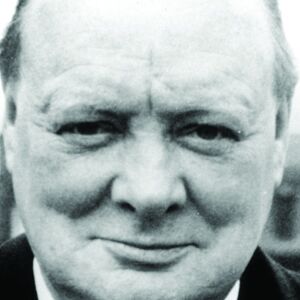
“A Law of History”
Henry Steele Commager wrote in the introduction to Marlborough (emphasis mine throughout),
[Churchill] accepted, instinctively, the attitude toward history which that century took for granted: that history, in the words of Bolingbroke, was philosophy teaching by examples. What is more, he was quite ready to stand there and point to the examples. Indeed we can say of Churchill what he himself wrote of Rosebery, that “the past stood ever at his elbow and was the counselor upon whom he most relied. He seemed to be attended by learning and history, and to carry into current events an air of ancient majesty.”
Nowhere does this appear more simply than in the “Grand Theme” which Churchill imposed upon his history of The Second World War: “In War: Resolution; In Defeat: Defiance; In Victory: Magnanimity; In Peace: Good Will.” He read history as a stupendous moral scripture, and for him the writing was, if not divinely inspired, at least authoritative. More, it was straightforward and simple. History was a struggle between the forces of right or wrong, freedom and tyranny, the future and the past. By great good fortune Churchill’s own people—“this island race,” as he called them—were on the side of right, progress and enlightenment; by great good fortune, too, it was given to him to buckle these virtues onto him as armor in the struggle for a righteous cause. If history was philosophy teaching by examples, what lessons did it teach? … First, history was not just the pursuit of idle hours but was, itself, philosophy and, rightly read, furnished lessons which statesmen could ponder and apply. Second, history was both memory and prophecy. It provided the counsel and the solace of the long view both to the past and to the future. The contemplation of the ages which mankind had somehow endured, and survived, infused the student with patience, with humility, and with courage; the prospect of a posterity which, a thousand years hence, might pronounce the verdict that one generation had given to a nation “its finest hour” encouraged resoluteness and hope, and strengthened the ability to confront crises that seemed insurmountable. Third, history followed great cycles: The same themes recurred, again and again, the same drama was played out, from age to age; and as men had somehow survived the vicissitudes of the past there was ground to hope that they might survive those of the present and the future. Thus four times Britain had fought to rescue Europe from the grip of a tyrant—Louis xiv, Napoleon, Kaiser William, and Hitler—and four times Britain had succeeded in saving Europe and, with it, the cause of liberty and justice. Here was a recurring pattern which augured well for the future of “this island race,” and of mankind, for, as Churchill saw it, the welfare of mankind was inextricably intertwined with that of the English-speaking peoples. Fourth, history bore witness to the vital importance of national character, for character was as important to a people as to an individual, and every nation must be alert to defend and preserve it. That each nation had a special character Churchill did not doubt, and as he contemplated the long arch of centuries he was led to a fifth conclusion, that it was, above all, the English character which had lighted up the corridors of time, flickering now and then but mostly pure and clear and even luminous—the English character and that of England’s daughter nations around the globe.
Today, character isn’t even important enough to raise as a political issue in Britain and America!
Commager continued, “From all this flowed a sixth lesson, that the test of greatness was politics and war. …
“‘Battles,’ he wrote in Marlborough, ‘are the principal milestones in secular history. … All great struggles of history have been won by superior will power wresting victory in the teeth of odds.’ [Our will power has been broken (Leviticus 26:19).] And elsewhere he concluded flatly that ‘The story of the human race is war.’ Like those statesmen he most admired, Marlborough, Chatham, Wolfe, Clive, Washington, Lee, he was himself a war leader; alone of great war leaders he was a great war historian.
“History—not least the history of war—taught a seventh lesson, and taught it not only to Churchill but through him: the vital importance of leadership”—another disastrous failure in Britain and America (Isaiah 3:1-4).
